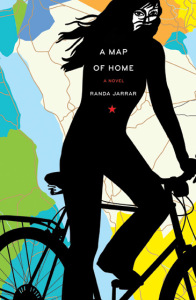I have really enjoyed this class covering Arab American
Literature. I took a class on the Arab World and a class in Arabic 1, so this class
added to my knowledge of Arabs and Muslims. In January, prior to the start of
course, I was hesitant to take this course because I knew it would involve
reading lots of books. When I was younger, I used to read a lot more, but lost
interest. When I saw the syllabus, I felt a little overwhelmed and when Dr. Esa
brought all the books we would read to our first class, and stacked the books
on the desk, I knew it would be a lot of reading. Thankfully, I kept up with
the reading. I learned about Arab Writers and Arab culture. I looked forward to
class and discussions. The discussions
were thorough and helpful in teaching us how to analyze literature. I took a class, 'Intro to Literary Analysis' (in Spanish), so I had some background in analyzing
texts. We read a lot of books and despite all the hard work, I feel accomplished.
Thanks to Dr. Esa and this course, I have started to read again. The pleasure
that was lost in reading has now returned. Looking back at my blogs, I am glad
I was able to blog every week and consider material discussed in class and
reflect. I plan to use my blog as reference for reminding myself everything we
learned. I will say, however, if a student is not interested in reading or
learning about other cultures, they should not take this class. I will recommend
this to students who are interested in the world and improving analytical
skills. I graduate this semester and am thankful for the classes I have had
with Dr. Esa, and this class on Arab American Literature. Four years went by
fast, but I am eager to use the skills I’ve acquired for future jobs.
Thursday, May 7, 2020
Sunday, May 3, 2020
Blog Entry 10
I enjoyed Sam’s presentation most on “I, the Divine.” The book seems really interesting. I liked how Sam presented with confidence. Sam explained the book thoroughly and she spoke clearly. You can tell she read the book and she seemed like she really enjoyed the book. She spoke with enthusiasm. She provided an excellent analysis at the end. She did not read the slides verbatim. She had appropriate images to go with her presentation. I found her character map to be useful. It had character relations in America and in Lebanon. Sam had thoughtful, intelligent discussion questions – she even explained and rephrased her discussion questions. The style of the book was most interesting to me because each chapter is written as a first chapter, the point of view from first, second and third person changes, the writing style from poetic to formal to causal changes, and the story is not told linearly. Sam had interesting quotes that went along with themes of the book. She explained her selected quotes in-depth. This presentation made me really want to read this book. It sounds exciting and I enjoyed learning about another book. She provided excellent background on the author of the book, Rabih Alameddine. Rabih was born to Lebanese parents and born in Kuwait. He moved to the United States to study in college. I thought it was unique that in addition to being a writer, Rabih is also an artist. He seems very talented to have great abilities in art and in writing. Sam definitely put a lot of time into preparing for her presentation. I was happy with how she presented it, and how clear she was with her summary and her analysis. Hopefully, when I get a chance, I will read this book. It is clearly a unique book that should be read.
Friday, April 24, 2020
Blog Entry 9
The title of Etaf Rum’s Novel, A Woman is No Man, represents female struggle in Arab Society. A woman does not have the power that a man has – the novel repeats the word ‘powerless.’ In the novel, the women are supposed to cook, clean, and watch the kids. Deya wanted to attend college, but Fareeda was not okay with that. Also, the novel touches on a lot on abuse, which we learn from Rum’s lecture that she herself was abused and her parents disowned her. The women in the novel were abused but did not have much of a voice. When Sarah left her family, she was disowned. From what I’ve learned, a man can divorce his wife; however, a woman cannot divorce her husband. In Arab society, Rum made clear that she really likes the hospitality in the Arab community, which is a nice part of Arab society. However, women do often get abused. Just because you don’t hear about it doesn’t mean it does not happen. Women have a voice but might not be heard. From my standpoint it is unacceptable, but I know it is part of the culture. On a similar note, I really liked how Rum opened up so much with our class. She shared a lot of information that you would never know by just looking at her. In addition, Rum explained how she was in an arranged marriage, just like the women in her novel. From what I understand, the woman does not get to choose, just as Adam was selected for Isra. Nevertheless, this novel and Rum’s talk, was eye-opening. I did not realize how common abuse is in Arab society and I did not realize how powerless some women feel. I am privileged as a white male, but am understanding and accepting of cultural differences.
Thursday, April 9, 2020
Blog Entry 8
Sunday, April 5, 2020
Blog Entry 7
A map of home is a coming-of-age novel about a girl, Nidali, who is born in Boston and throughout her childhood and adolescence, makes her way from Kuwait to Texas. She encounters arguments with her father, love and compassion, and explores her own sexuality. Nidali is very bright and her father advocates for a strong education and emphasizes the importance of Nidali attending school even if there is only one exam. Her father can be abusive and abrasive at times with Nidali, and her younger brother, Gamal. He does seem to care for his children, but also gets into arguments with his wife. As a result of the gulf war when Iraq invaded Kuwait, Nidali and her family move to Egypt. Nidali’s father is from Palestine and her mother is from Egypt. Her grandmother is Greek, so Nidali struggles with her own identity. She has friends in every place she and her family move, and has boyfriends, but when Nidali moves to Texas, she meets another boyfriend and loses her virginity. Nidali is a complex character who deals with heartbreak and struggle. In fact, her name means ‘struggle.’ While her family life is complicated, and her love life is confusing, Nidali finds out who she is. At the end of the story, she gets ready to leave for college in Boston. It is interesting that she is born in Boston (at the beginning of the story) and attends a college in Boston (at the end of the story). Young people might be able to relate to Nidali and her struggle as growing up is not always easy. This novel touches on issues that are controversial, and Randa Jarrs’s explicit language makes the novel even more impactful. Everyone can look and Nidali and find some commonality regarding growing up and getting through tough times.
Sunday, March 29, 2020
Blog Entry 6
I read a story from The Inheritance of Exile entitled, “The Journey Home” about a woman named ‘Hanan.’ I enjoyed reading the story. I liked how John was not from Palestine and dated Hanan. They fought a lot, and things did not work out. However, early on in the story John was nice to Hanan and would rub her feet and take care of her. When Hanan had a son, it changed her life, but her life was not perfect. John could be abusive and even with Aliyah’s help, she struggled. Hanan did not have a great relationship with her Mom. Hanan planned to visit her parents and bring Michael along despite knowing in advance that there might be conflict. Hanan took off and drove with Michael to her parents’ house, which is in South Philly. Hanan got along with her baba, but since there is tension with her mother, Hanan did not stay long. This was upsetting especially for her baba because he enjoyed the time they had together. One night, Hanan received a scary call. She learned that her Baba had a heart attack, but thankfully lived. I am glad the story ended this way, rather than a sad ending. I enjoyed this story because it shows that relationships are not always easy and living as the daughter of a Palestinian immigrant is tough. It shows real life and the truth in some ways. I really liked when Susan Darraj was able to join our class on Zoom and share her story and talk a little about her books. She seems so busy but finds time to write. When things slow down when classes end, I might look into some of her other books. Her book The Inheritance of Exile can hopefully help other children of immigrants get through more difficult times.
Sunday, March 8, 2020
Blog Entry 5
The role of food in the novel, “Crescent,” is important
because food brings people together. Sirine is the head chef at Naida’s café and
spends a lot of her time in the kitchen. The novel mentions certain Arab dishes
such as baklava and kanafeh, and there are even recipes at the end of the
novel. The kitchen is important in the Arab world because that is where
memories are made. Any time there is a meal, everyone gathers in the kitchen to
visit and sit down to eat. Also, in the novel, Sirine mentions her family recipes
and how much they mean to her. Food is a human connector because at the dinner
table, everyone can share a laugh and visit and reminisce about the past.
Nostalgia is an important theme in Arab-American literature. Food is intimate because it draws people
closer, especially when everyone is together.
Food is a metaphor for Sirine’s experience because it symbolizes her
roots, her passion, and how she is able to connect with others. For example,
she is able to get to know a lot of the students and professors at the
University because they visit frequently, love her food, and they can chat. Sirine
has also met Han at the café, and ended up having love for Han. Food is a
common topic in the novel. It seems like every chapter practically relates the
story to food. Sirine rarely misses work after nine years, and is always cooking.
Food itself can have meaning because it is where memories are made. Food can connect people through laughter, and
it is an excuse to enjoy a nice meal, while everyone is together. Sirine feels
it is important to bring what she knows from generations before to cook family recipes
for other’s to enjoy, and to meet new people.
Saturday, February 22, 2020
Blog Entry 4
Following the 9/11 attacks, Muslims and Arabs were treated poorly. Hate crimes against Arabs and Muslims spiked 1,700 percent in the first six months after September 11. Moustafa Bayoumi writes stories about young Arabs in America. The FBI held meetings with the community leaders and leaders were required to condemn terrorism in front of them. Prior to 9/11, only 11 FBI agents could speak Arabic fluently. There are terms that have been created known as ‘flying while Muslim’ or sometimes, TWA (traveling while Arab). We learned in class about Arabs on flights being asked to leave because they were speaking Arabic. This caused controversy. In one of Moustafa’s stories, Rasha, a young Arab woman, was arrested along with her family because she had her visa refused. She, her mother and sisters met Pakistani women, Arab Women, and other Muslims detained under similar circumstances. The correctional officers treated them with little respect, and Rasha found them abusive. They were released three months later. When Rasha ran into a former guard at a restaurant, she confronted him. He replied, “Ah, wow. See? You cleaned up your act. At airports, Muslims are racially profiled and might be ‘randomly’ selected for further screening. When Arabs come to the United States, and their name is Osama or Najwa, they are asked if they want to keep their names. Some names such as A.J. Racy have been abbreviated from Ali Jihad (A.J.). There is also a Patriot Act where the government, for instance, has the right to demand what books you rented at a library. Moreover, Muslims and Arabs might live in Brooklyn or Detroit because there is a higher concentration of Arabs in these communities. Still today, there is discrimination, hatred, and hostility toward Arabs. Not all Arabs are terrorists, in fact, Islam itself is a peaceful religion. It is a shame the fear and worry Arabs and Muslims live with following 9/11.
Sunday, February 16, 2020
Blog Entry 3
106. Suheir Hammad - "We Spent the 4th of July in Bed
Friday, February 7, 2020
Blog Entry 2
I
believe Kahlil Gibran is an excellent representation of Arab American culture.
His book, "The Prophet," was very successful, translated into so many
languages and is used today for celebrations including weddings and funerals. I
felt sorry that Kahlil lost family members early on, and did not come from much
money. He was not going to be rich from writing, "The Prophet."
However, his stories are inspiring. I enjoyed the movie, and found the images
of each story to be cultural. The stories were told through imagery, which is
common in the Arab World. Each story about love, marriage, and death all were
posed so beautifully. I liked how Al Mustafa was not afraid to be locked away
or die. He seemed almost relaxed and comforted in knowing his afterlife. I liked
when Almitra finally spoke. I knew she would at some point, but I kept waiting.
I was happy that Almitra and her mother were able to protect his paintings and
writings from the authority. In addition, I liked how when the town’s people
were upset with Almitra for stealing, Al Mustafa made them settle down and be
nice to the little girl. He protected her, and she wanted to protect him in
prison and get him to escape. I also liked how well-respected Al Mustafa was in
town. No one wanted to see him leave or be locked up or die. Everyone was
rooting for him. To me, this makes me believe his stories were meaningful and
inspired others. I feel as though Kahlil Gibran was clearly talented, but was
able to use his success to impact the lives of others. I am glad we got a
chance to learn about him in this class because I never heard of him prior. My
mom says she has heard of the book, but I had not.
Friday, January 31, 2020
Blog Entry 1
I decided to take a class on Arab American Literature because I am interested in the Arab World. I took a class with Dr. Esa, "The Arab World," and thoroughly enjoyed this class. I am always fascinated in learning about other regions in the world and discovering different cultures. I like the Arabic language, and I am taking a class on religions where I hope to learn more about Islam. There are so many stereotypes about Arabs including belly dancing, playing with snakes, etc. But there are also other associations with Arabs and America, and sadly some Americans view Arabs as terrorists and suicide bombers. Arabs have been discriminated against including refusing entry to the United States.
Moreover, I feel this course will teach me about Arab Americans and their successes, and how they overcome hardships. I want to learn about famous Arab Americans and their contributions. I also hope to learn more about the Arab World and the Arab culture. I want to learn what Arabs write about, how they write, how their stories are transcribed, and personal accounts.
I remember from taking Arab World that Arabs are welcoming folks, and will always show hospitality. If an Arab needs a place to spend the night, another Arab will welcome this person in. Also, the Arab World has some overlap with the Middle East in terms of which countries are Arab. There is a difference between a Muslim and Arab, as Arabs speak Arabic, or have an immigrant parent who speaks Arabic as their native language. Muslims don’t have to know Arabic, and there are a lot more Muslims in the world. There are Arab-Christians as well. Arabs live all over the world, including the United States. Thus, Arabs are not confined to a specific region. There are many famous Arab athletes, writers, singers, actresses, etc. in the United States.
MAP OF ARAB WORLD

Moreover, I feel this course will teach me about Arab Americans and their successes, and how they overcome hardships. I want to learn about famous Arab Americans and their contributions. I also hope to learn more about the Arab World and the Arab culture. I want to learn what Arabs write about, how they write, how their stories are transcribed, and personal accounts.
I remember from taking Arab World that Arabs are welcoming folks, and will always show hospitality. If an Arab needs a place to spend the night, another Arab will welcome this person in. Also, the Arab World has some overlap with the Middle East in terms of which countries are Arab. There is a difference between a Muslim and Arab, as Arabs speak Arabic, or have an immigrant parent who speaks Arabic as their native language. Muslims don’t have to know Arabic, and there are a lot more Muslims in the world. There are Arab-Christians as well. Arabs live all over the world, including the United States. Thus, Arabs are not confined to a specific region. There are many famous Arab athletes, writers, singers, actresses, etc. in the United States.
MAP OF ARAB WORLD

Subscribe to:
Comments (Atom)



/cdn.vox-cdn.com/uploads/chorus_image/image/55911717/1_J85jI_HahBSm4U8FSvCd3A.0.jpeg)






